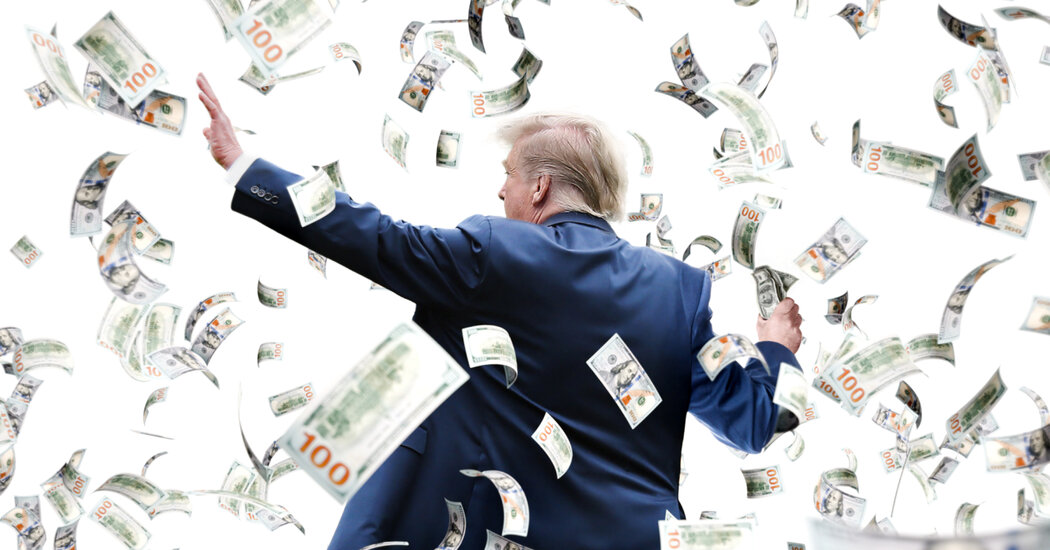President Trump has more than doubled his personal wealth since starting his 2024 election campaign. Billions of foreign dollars have flowed into his family’s real estate and crypto ventures. A plane that doubles as a “palace in the sky” has been given for Mr. Trump’s use by the government of Qatar.
It is easy to dismiss this as just a bigger and more brazen version of the self-dealing we saw during the first Trump term. But it poses a more fundamental danger. Our political system is being transformed into something that no longer serves the people. Indeed, the United States is seemingly becoming just another country with a corrupt strongman personalizing and profiting from power.
Vladimir Putin pursued this playbook in Russia. The news media was forced into the hands of his political allies. Natural resources and lucrative contracts were turned over to his associates. Mr. Putin reportedly became one of the world’s richest men while creating a system in which the nation’s interests became indistinguishable from its leader’s.
This fusion of political and personal interests was on display in Russia’s 2014 annexation of Crimea. As Mr. Putin’s approval ratings soared, so did the wealth of his associates. To take just one example, his former judo partner — Arkady Rotenberg — received a contract valued at over $3 billion to build a bridge linking Russia and Crimea. Corruption allowed Mr. Putin to consolidate power, and power facilitated ever more corruption.
Hungary’s prime minister, Viktor Orban, a MAGA favorite, has pursued this playbook on a smaller scale, leveraging the power of the state to marginalize opponents while his associates became ostentatiously wealthy. As with Mr. Trump and the Turkish president, Recep Tayyip Erdogan, this includes Mr. Orban’s son-in-law. Family members and associates double as gatekeepers and deal makers operating outside formal government roles, which come with rules and oversight.
Sandor Lederer has run a Hungarian anti-corruption organization for more than 15 years, throughout Mr. Orban’s second stint as prime minister. The story he tells echoes America’s. A justice system being captured by the leader’s loyalists. Checks and balances weakened or ignored until they barely exist. Moral and ethical frameworks eroded. Oligarchs becoming richer and more powerful than institutions.
Mr. Orban responds to scrutiny over corruption by lashing out at opponents. Over time, apathy can take hold. “You follow politics like you would a soap opera,” Mr. Lederer told me, “without feeling that you can do anything about it.”
Mr. Lederer likened the pressure corruption puts on a political system to a river bearing down on a dam. Once the dam breaks, you’re washed downriver by currents you can’t control. If you try to rebuild the dam, it’s too late; opposition parties in Hungary, as in the United States, failed to understand that the system collapsed — the dam broke — because the rules and expectations it relied on had disintegrated beyond salvaging.
When that happens, it seems only to confirm what leaders like Mr. Orban and Mr. Trump have been saying all along: The system was rotten, and the opposition parties were clueless to reality or too feckless to change it. The corruption becomes a flood, a new normal, carrying the entire country along with it.
Americans are farther downriver than we seem to understand. Indeed, over the past several months, Mr. Trump has made moves that far exceed anything Mr. Orban has done. What separates Mr. Trump from an Orban or even a Putin is the awesome economic, technological and military power of the enterprise that he now leads: the United States of America.
No country has more leverage over the global economy. Through tariffs announced on every country on earth, Mr. Trump has personalized that power. Tariffs give him the authority to move markets. He can turn the dial up or down. He has bypassed Congress and cast efforts to constrain him as anti-American, lashing out at “USA HATING JUDGES” on a trade court that tried to limit his tariff authority. This creates limitless opportunities for profit.
On “Liberation Day,” Mr. Trump announced a 46 percent tariff on imports from Vietnam. He then paused it and created a 90-day period to negotiate. During this window, the Vietnamese government hastily approved a $1.5 billion deal involving a Trump golf complex before a ceremony attended by Eric Trump. (Legally, Mr. Trump’s sons run his companies, which the White House claims prevents potential conflicts of interest.)
It’s impossible to know if this was a quid pro quo for tariff relief. But the ambiguity is the point. Governments like Vietnam’s are left to wonder what they can do to appease the U.S. president.
The American people will be losers in this process. Mr. Trump has ideological and personal reasons to perpetuate tariff uncertainty to maintain his power. Even if he succeeds in extracting some trade concessions, American businesses, investors and consumers have to expect continued volatility, higher prices and only temporary resolutions to trade tensions.
In the medium term, countries like Vietnam or blocs like the European Union will most likely pivot away from the United States to protect themselves from an erratic American president and a dysfunctional American system. Why keep a noose around your neck when you can shift trade, supply chains and investment elsewhere — perhaps to a more predictable China?
Or take technology. On his recent trip to the Persian Gulf, Mr. Trump scrapped Biden-era restrictions on the export of advanced semiconductors and artificial intelligence to the United Arab Emirates and Saudi Arabia. Was this a considered policy decision about the proliferation of sensitive technology or a result of a $2 billion Emirati investment in a Trump crypto venture? Again, the ambiguity is the point, and many foreign governments are likely to bet on the latter.
This is no mere get-rich-quick scheme. In the second Trump term, A.I. is going to be increasingly deployed globally. In the absence of careful planning, U.S. workers could face mass job displacement. In the absence of regulation, A.I. poses security threats: from cybercrime, disinformation and surveillance to the production of new weapons to the unforeseen dangers of superhuman intelligence. Yet instead of empowering experts or negotiating norms, Mr. Trump has slashed government agencies and personalized decisions. The “big, beautiful bill” that passed the House would even bar states from regulating artificial intelligence for 10 years. Power, and the potential to profit off it, rests with Mr. Trump and whomever he favors.
This personalized approach to power infuses Mr. Trump’s transactional worldview. Rules are less important than money. Value propositions are seen as naïve. Institutions, laws and norms have given way to the logic of deals. That begets danger as the water continues to rush downriver.
If deregulated crypto markets generate a worrisome bubble, will Mr. Trump prioritize his family’s investments or the health of the global financial system? If justice is selective and pardons can be purchased, will white-collar crime proliferate? If the Foreign Corrupt Practices Act continues to go unenforced, will bribery be normalized as the cost of doing business?
Globally, it would be strange if resource-rich countries like Russia and Venezuela didn’t try to entice sanctions relief through the promise of deals. Already, Indian commentators have voiced concern that the recently created Pakistan Crypto Council signed a deal with the Trump family’s business. Those kinds of deals — and the suspicions they arouse in foreign capitals — could affect the capacity of the United States to mediate disputes without its motivations being questioned.
Then there is the most powerful institution in the U.S. government: the military. Mr. Trump has pledged a trillion-dollar defense budget. Given the fealty to the president demonstrated by Secretary of Defense Pete Hegseth, how can we be assured that vital contracting decisions will be made based on the nation’s security and fiscal health and not on a pay-to-play basis?
Most acutely, there remains Mr. Trump’s fixation on territorial expansion. His repeated pledges to take over Greenland can seem fanciful and would very likely rupture NATO, given Denmark’s sovereignty over the island. But Greenland is rich in critical minerals and oil and gas. As with Russia’s annexation of Crimea, Mr. Trump could see conquest as both a vehicle for personal prestige and a potential windfall for whoever seizes those resources, which would be his to control.
Corruption is a powerful tool, but it is not popular. To build a movement powerful enough to push back on Mr. Trump’s self-dealing, Democrats must show people how it will affect their lives. The outrage isn’t just that the Trumps are getting richer or can fly on a fancy plane; it’s that your car payments and groceries will be more expensive because of tariffs, that you could lose your job if A.I. is unregulated and that the world will become more dangerous if there are no rules — only deals and the perpetual aggrandizement of the president’s ego.
Already, Mr. Trump has cut government programs that people depend on but that do not bolster his power or offer opportunities for profit. Indeed, the “big, beautiful bill” that makes up his legislative agenda would be a boon to his family and wealthiest supporters while slashing Medicaid and nutrition assistance. It would add over $2 trillion to the national debt while exploding inequality and making life worse for many Americans. That, too, is a story of corruption: Russians and Hungarians deal with struggling economies and declining services while their leaders become richer and more powerful.
“Don’t try to restore the dam,” Mr. Lederer advised me. “Better to regroup and go down the river to build a new dam.” That means focusing efforts on state and local governments, where Democrats can reduce the power of special interests and fill some of the gaps left by a federal government devoted to serving Mr. Trump’s interests.
Nationally, Democrats must show they will be different not just from Republicans but also from their past. They can break with wealthy donors and special interests by demonstrating a willingness to pick fights with powerful constituencies. Proposals to reform a corrupt political system should be integrated into proposals to deliver better services: through greater transparency, new accountability mechanisms and a federal government less distant from the people.
A virtuous toughness is in order: Democrats should make clear that they are keeping score of who is capitulating to Mr. Trump and participating in corrupt practices. That can serve as both a deterrent and a reminder that citizens — voters — have agency.
It’s not as if the United States was perfect before the 2024 presidential election. Yet Donald Trump is demonstrating what happens when our sense of ourselves as a singularly exceptional nation, unbound by the rules that govern everyone else, is transferred from the nation to one man. We’ve had bad presidents before, but none who have personally profited as much from the office. Markets and institutions can impose some guardrails, but ultimately nothing will impose a meaningful check like the mobilization of the American people.
The last time this country had a Gilded Age was in the late 19th century. It gave birth to American populism and, ultimately, a progressive era of politics that transformed both parties and raised people’s expectations for politicians and their government. Conditions are ripening for that to happen again. The alternative may be an end to American democracy itself.
Ben Rhodes, a contributing Opinion writer, is a former deputy national security adviser and the author, most recently, of “After the Fall: The Rise of Authoritarianism in the World We’ve Made.”
Source photo by Win McNamee/Getty Images
The Times is committed to publishing a diversity of letters to the editor. We’d like to hear what you think about this or any of our articles. Here are some tips. And here’s our email: [email protected].
Follow the New York Times Opinion section on Facebook, Instagram, TikTok, Bluesky, WhatsApp and Threads.
The post Corruption Has Flooded America. The Dams Are Breaking. appeared first on New York Times.




